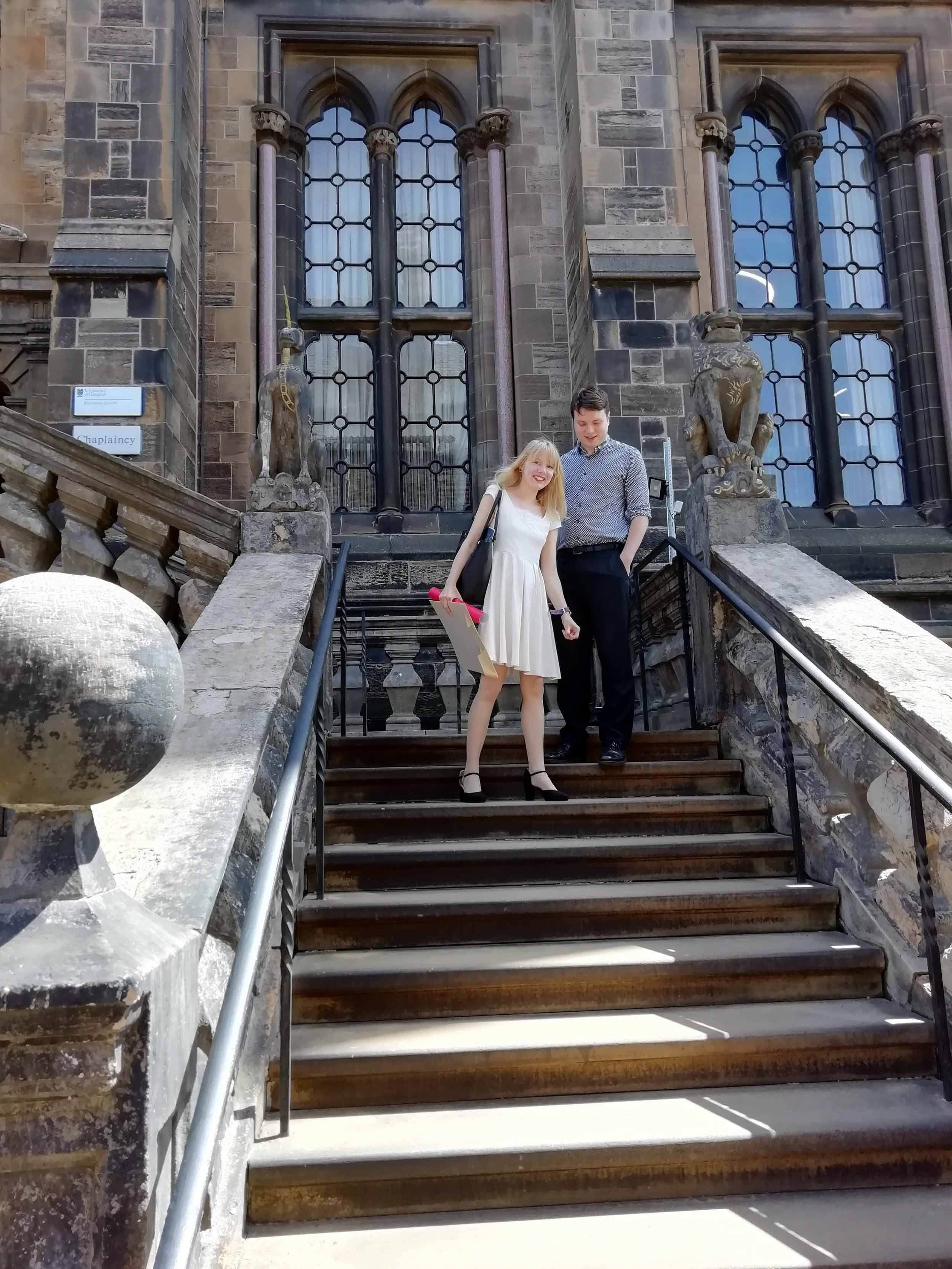how i found myself in a strange discipline
It’s been a really long time since I wrote anything more comprehensive about studying in my blog, so I thought I’d write down some thoughts before starting my postgraduate degree, in case it might be helpful to anyone else with similar interests considering their options. This will probably get a bit long and rambling, so I apologise in advance!
In late June, a four-year period in my life came to end, as I graduated with a 1st-class MA in Politics from the University of Glasgow. This degree is actually a Master’s in name only - the ancient Scottish universities give MAs at the end of 4-year undergraduate degrees. It’s a pretty confusing system, and alas, I’ve decided to stay in school a while longer and (hopefully!) get a real Master’s.
Around this time a year ago, I was frantically finishing up the last essays and exams of the summer semester at the University of Tokyo, where I spent the 3rd year of my degree. With my return to Scotland and the final year of my degree (with added dissertation stress) looming over me, I was trying to squeeze in some time for goodbyes to all my favourite people and places in Tokyo.
Fast forward to today, I’ve just completed my registration as a graduate student at the University of Oxford, where I will start an MSc in Japanese Studies this October. I’ll be studying at St Antony’s college, which is specialised in international relations, area studies and other social sciences; while my school is OSGA, or the Oxford School of Global and Area Studies, which in turn belongs to the Social Sciences Division.
A lot has happened over these 12 months for this to be possible - I worked really hard in my final year at Glasgow, balancing dissertation work, coursework, JLPT N1 studies and freelance work. It was pretty intense, and now I’m rewarding myself with a probably even more intense year of academia! However, I couldn’t be more excited to start - I guess I just like pushing myself.
I wasn’t always sure if I even wanted to do a postgraduate course, and only really started considering it seriously last November, as I was knee deep in writing the first draft of my dissertation. I spent a few weeks frantically comparing different programs until finally narrowing down my choices, sending out my reference requests and drafting my personal statements over the Christmas holidays. The application process was long and draining, because I had to wait for months until I heard anything back, and then spend several more to get everything in order (making sure I’d get the grades I need, college placement, funding, accommodation, et cetera). Now, I’m finally at the stage where it’s starting to feel real and tangible.
So.. Why Area Studies?
This is a question I found myself thinking about quite a lot during the application process, probably because area studies is a less familiar field of study, so it wasn’t immediately clear to me what this would mean in practice. While moving from political science to area studies might seem like a bit of a departure, I’m actually expanding rather than changing my field of study. Area studies is an interdisciplinary field that encompasses political science and IR as well as many other disciplines, both within and outside the social sciences. In practice, this means I can continue engaging with the same themes, methodologies and questions I have been so far, while also hopefully gaining new inspiration and knowledge from less familiar fields.
My degree will comprise of two courses on research methods, a postgraduate dissertation, a Japanese language course, and two optional courses on relevant topics. Looking at the list of optional courses, they include both social sciences and arts, with topics such as politics, sociology and economics on one hand, and literature and linguistics on the other (of course, there are also topics that don’t fit into this kind of a dichotomy). Coming from a background (and continued interest in) politics and IR, I intend to focus my studies and dissertation on the social science branches of the course.
The reason I chose to study politics in the first place was that I’ve always been curious about how human organisations (societies, national identities, international systems..) are formed and develop over time; what are the constants and the peculiarities in these processes; how can we begin to solve social dilemmas that appear unsolvable, particularly those of global inequality and environmental deterioration; what methods and methodologies are best suited for studying social constructs and guiding policy-making; what are the philosophical underpinnings of the way we conduct everyday politics.. There is an endless number of questions that I’ll never get tired of thinking and reading about, and particularly moving on to the postgraduate level, I want to gain more experience in planning and conducting my own research as well.
So why did I decide to apply for a Japanese Studies programme, instead of a (for example) Comparative Politics or International Relations programme? Broadly speaking, I had two key criteria for my postgraduate degree - I wanted to do something more strongly specialised on the postgraduate level, since my undergraduate degree was a generalist one, and to study a subject I am genuinely passionate about. I feel this programme fulfils both of these conditions.
In hindsight, I’ve also been sort of intuitively steering myself towards area studies throughout the last 2 years of my undergraduate degree. Thinking about politics in a comparative perspective and seeing how theories or hypotheses work out on a regional level has been, for me, one of the most interesting parts of studying politics. I guess this interest in comparative politics is intertwined with my theoretical viewpoints. Although I believe in being adaptable and looking for answers in various ways, instead of being dogmatic about a certain approach, I find my views on IR broadly aligned with constructivism on questions of state formation and behaviour; I understand states as not static beings but constantly in the process of shaping themselves and each other. Because of this, I think area studies, with its explicit recognition that domestic and international levels of politics are interconnected, feels right for me.
Of course, my interest in East Asia specifically doesn’t just logically follow from an interest in certain methodologies - my personal experiences and emotional attachments have informed my direction in many ways. For reasons I don’t fully understand, I’ve been interested in Japan and the wider East Asian region since childhood, endlessly (and pretty inefficiently) self-studying languages, but I never really had the chance to study these subjects in a formal setting before my exchange year. Going to the University of Tokyo for my 3rd year was an eye-opener in this sense, as I finally got to take courses in areas such as East Asian IR and Japanese politics, and I found it immensely rewarding academically. That’s when I realised I would love to be able to combine my general interest in social science with the more specific study of the region, including the linguistic and cultural aspects. There are no courses focusing on Japan in Glasgow, so I devoted most of my final year to studying Chinese politics/IR instead, taking all the courses I could find and writing my dissertation on Chinese environmental politics. In this sense, I feel like continuing to area studies on the postgraduate level is a natural direction for me.
Within this field of study, I was also considering ‘East Asian Studies’ programmes, which have a similar approach with a broader regional focus, but there is a very limited number of institutions offering this program in Europe (it appears to be much more common in North America, but I didn’t want to apply there). Leeds and Sheffield offer postgraduate degrees in wider East Asian studies; however, I had decided the only schools I would apply to in the UK were Oxford or Cambridge, because the financial burden of doing a postgraduate degree there is so high. I thought that if I couldn’t get into a top UK school, it would be more sensible to either do a postgrad at home in Finland, where it’s tuition-free, or not do it at all.
I was also considering applying to universities in Asia, but staying in Europe seemed to make more sense for both financial and personal reasons. I did think about applying for the MEXT, which is a very generous scholarship for postgraduate studies in Japan, through the Finnish embassy; I have a friend who got it and has been enjoying her course at Toudai. However, the application period only starts in late May and is very long - if I’d have applied this year, I could only have started the course in 2020, so I started thinking of it more as a plan B and set my sights primarily on European schools.
In the end, I thought I should quite literally “go big or go home” and applied to two programmes in January: the Japanese Studies MSc in Oxford and the East Asian Studies MA in the University of Turku, my hometown institution. I got accepted to both, and decided to go with Oxford, because it would honestly have felt mad to turn down the offer. I’m really looking forward to my time at St Antony’s and hoping that I could also engage with other disciplines by attending events and such; I particularly want to follow the work of the China Studies centre. All in all, I couldn’t be more excited to devote myself to studying something I love in an inspiring environment.





